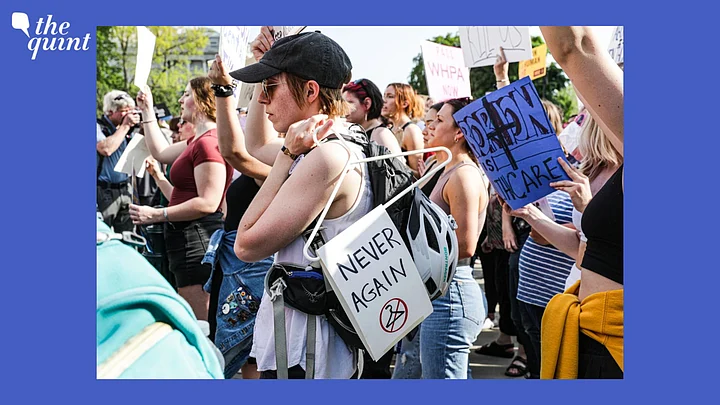You have probably spotted the twisted iron coat hanger many a times on social media over the last few days – used as a symbol to protest the United States Supreme Court's overturning of Roe vs Wade; or maybe, you have spotted it on a poster at a women's march; or heard someone say how the US is going back to 'coat hanger abortion' days.
Pro-choice activists want us to stop using this symbol and phrase – that has inevitably become synonymous with at-home abortions.
Calling it 'outdated' and 'harmful,' the excessive use of 'coat hanger abortion' may actually be doing more damage than help – by preventing people from learning about safe abortion pills, explain activists.
How Coat Hanger Became a Protest Symbol
"A coat hanger abortion is an unsafe abortion," Marva Sadler, senior director of clinical services at Whole Woman's Health, a non-profit abortion provider operating clinics in several states, told Women's Health Magazine.
It refers to the practice of using an object to induce an abortion – due to unavailability or lack of safe abortion access, she explained. This was drawn from the fact that women were turning up in hospitals with perforated uterus.
"There were also increasing numbers of women showing up in hospital emergency rooms with perforated uteruses and other signs of having tried to abort [a] foetus," Carol Sanger, a Columbia Law School professor specialising in abortion, told the magazine.
The first time the coat hanger was used in a pro-choice protest was in April 1969 – just four years before the Roe vs Wade verdict. At least 3 lakh protestors in Washington marched with coat hangers around their neck, with most of them also carrying – “Never Again” posters.
Since then the symbol became synonymous with pro-choice protests in the pre-Roe world in the US – when the process was secretive, and dangerous.
The coat hanger saw a resurgence earlier in May 2022, when a college student shipped six coat hangers to the Supreme Court from Amazon over the Roe vs Wade leak. In a viral TikTok video, that was viewed over four million times, she also called for more people to send coat hangers to the apex court.
Retire Coat Hanger, Adopt the Pill Instead
“Please consider leaving the coat hangers in your closet, as they contribute to fear mongering narratives about ‘back alley’ abortions,” Meg Sasse Stern, the support fund director for Kentucky Health Justice Network (KHJN), an abortion fund that’s been helping residents with financial and logistical support, told Jezebel.
Instead, activists collectively call for the use of abortion pill to be amplified – while asserting that the overturning of the 1973 landmark ruling does not mean a blanket ban on abortions in the US.
They argue that self-managed abortions in 2022 look very different from the pre-Roe era, all thanks to the safe and effective abortion pills – mifepristone and misoprostol – approved by the Food and Drug Administration (FDA) and used during the first trimester of pregnancy.
"Before these medications were available, patients didn't have as many safe options to self-manage their abortions. Using the coat hanger image perpetuates a "harmful and false narrative about what self-managing care can look like" these days," Dr Selina Sandoval, Ob-gyn specialising in abortion care, told Women's Health Magazine.
“Self-managed abortion is safe and effective when people have the right information, and support. People have been, and still are, managing their own pregnancy outcomes and that will continue, so let’s amplify safer methods for people who choose to self-manage care for whatever reason."Meg Sasse Stern, Kentucky Health Justice Network
People on Twitter also pointed that continued use of the coat hanger imagery furthers stigma and misinformation around self-managed abortions. This again, will affect the marginalised, economically backward communities, and pregnant teenagers the most – due to restricted access to information as well.
How Can People Get Abortions in State Where Access is Restricted?
With the overturning of Roe vs Wade, access to abortion will be banned or restricted in at least half the states in the US. For those who live in states where abortion still remains legal after the overturning of the constitutional right – abortion pills can be ordered online.
They can also be mailed to your home, picked up from a doctor, a nurse, at Planned Parenthood, or at any clinic of people's choice.
If pills are not legal in the state, one can visit the Miscarriage and Abortion Hotline or PlanCPills.org – where you can get resources and information about accessing them within your state.
Another option is for pregnant persons to travel to states where the abortion pills are legal. You can also get a trusted friend or family to travel with the pills from their state.
But this comes at an expense – especially for those people who may not be able to afford it. If you need help paying for an abortion, childcare, travel or accommodation, one can local abortion fund, activists advise.
Companies like Amazon, Tesla, and Citigroup have also announced that they will help cover employees' costs to travel for an out-of-state abortion, CNN reported.
With the end goal being better and safe access to abortion care, information on accessing abortion pills – not methods that perpetuates fear and stigma – needs to be at the forefront of discourse.
(At The Quint, we question everything. Play an active role in shaping our journalism by becoming a member today.)
